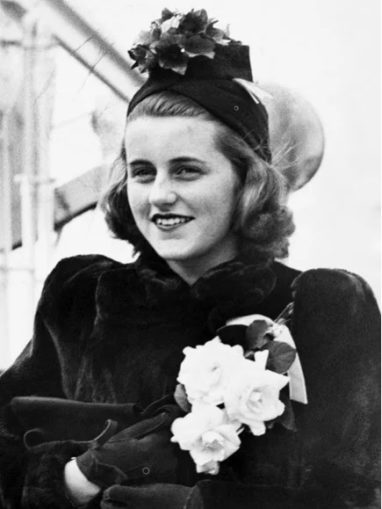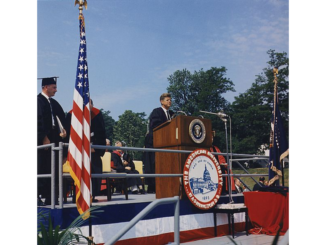
by AnonymousUnknown author is licensed under CC BY-SA 4.0
The subtitle of this book is ‘the true story of Kick Kennedy, JFK’s forgotten sister, and the heir to Chatsworth’, although personally I think the title ‘forgotten sister’ might be more accurately applied to JFK’s sister Rosemary (more on her later). I was interested to read this book for several reasons: I have read others by Byrne and enjoyed them, but those were mainly on the eighteenth century; I had come across reference to Kick Kennedy while reading ‘Black Diamonds’ by Catherine Bailey, the story of Wentworth Woodhouse (a terrific book, thoroughly recommended); also, I was curious to learn more about the Kennedy family background. Although almost everyone has heard of JFK and his brother Bobby, I knew next to nothing about their parents or siblings.
The Kennedys obviously, on the face of it, typified the Great American Dream: originally a poor Irish immigrant family (all four grandparents immigrated to the US in the 1840s), they ended up providing two presidents, a fabulously wealthy mogul (father Joe), a war hero with film-star looks (Joe Jr) and a sister who married into the very top echelons of the English aristocracy (Kathleen, known as ‘Kick’). But other dynamics were also at work. Joe’s tremendous wealth came from commodities, real estate, insurance and a wide range of other businesses. He cannily took his money out of the stock market just before the 1929 Wall St crash and put it into movies. Later, he bestowed on each of his children a multimillion-dollar fund. He was a harsh taskmaster, prescribing the children’s every activity, restricting their food lest they become fat, and carrying on an affair with actress Gloria Swanson for many years. Rose, a devout Catholic to the point of fanaticism, was expected to put up with his moods, neglect and dictatorial temper. Clearly she saw the outside world as Joe’s business, and family as hers. She, too, demanded a lot from her children and would brook little or no resistance. Still, a lot of fun was had, particularly at the family’s Hyannis Port compound on Cape Cod, with sailing, diving, tennis, swimming, water skiing, socialising and quizzes keeping everyone entertained. Mealtimes were sacrosanct – all had to attend, and all had to participate with lively conversation, amusing anecdotes and informed political opinions.
In addition to fame, success and wealth, the Kennedys have also always been associated with tragedy. Joe and Rose’s daughter Rosemary (probably the most beautiful sister) had been born mentally impaired, due to the nurse/midwife refusing to let the baby be born until the (very late) doctor arrived. Her condition was later made worse by experimental lobotomy treatment. She was eventually sent to be cared for in a residential home. Joe Jr was the leader of the children, a steady, sensible, responsible older brother. Jack (later to be JFK, President John Fitzgerald Kennedy) was clearly cut out for greater things, yet Joe once said, “All my ducks are swans, but Kick was especially special.” Jack and Kathleen had a lively, bantering relationship. Although not classically beautiful, Kick was bubbling full of charm, wit and intelligence, with sparkling blue eyes, an impish grin and a lively manner which seemed to light up a room and make everyone’s spirits rise. She was sporty, energetic and unstuffy.
The family’s life was to change forever when Joe was appointed Ambassador to the Court of St James in 1938. Kick was presented at court, and was photographed as a debutante along with her mother and Rosemary (whose behaviour had not yet become as unmanageable as it later did). Subsequently Kick enchanted and bewitched everyone she met – including the irascible, anti-American Evelyn Waugh. Kick began to feel that England was really her home and where she belonged, the English psyche being more attractive to her than the American. ‘You’ll never be happy in America now that England is in your blood’, Nancy Astor told Kick. Under the increasing threat of war, she chose to the horror of her family to stay in England, working for the Red Cross and also as a journalist. Eventually, she met Billy Hartington, the tall, debonair heir to the Duke Of Devonshire at Chatsworth. They fell deeply in love with each other, but here was a seemingly insurmountable problem: Billy’s family, the Cavendishes, had historically played a large part in the Protestant succession, whereby the Catholic king James II had been driven out and been replaced by William of Orange, and were tremendously proud of their heritage. It was what their dukedom was founded on. Billy’s future children could not possibly be brought up Catholic – apart from anything else, the family had forty Church of England livings (appointments of vicars) in their gift. Though they adored and welcomed Kathleen, anti Catholicism was woven deep into their DNA. As, of course, was anti Protestantism into Rose’s: the very idea of Protestant Kennedy grandchildren was complete anathema. Kick’s struggle with these very real issues is one of the strengths of the book (Byrne is herself a Catholic whose grandfather and mother were Irish Kennedys).
Eventually, Kick and Billy overcame all their obstacles and were married, but only for a very short time before he was killed towards the end of the War. All that agonising had been for nothing: there were to be no Cavendish children for Kick or Billy. The eldest Kennedy boy, Joe Jr, was also killed after volunteering for a particularly dangerous mission. Then began a period of rootlessness for Kathleen, torn away from her new life and stability yet unable to contemplate permanently returning ‘home’. Unaccountably for some, she soon fell hard for playboy Peter Wentworth-Fitzwilliam, owner of Wentworth Woodhouse, one of the largest stately homes in England, a man of uncertain reputation. I won’t spoil the ending, but their romance led to yet more, final tragedy. The Devonshires behaved impeccably throughout; the Kennedys, less so.
The book rattles along and is of interest among other things for its depiction of London before, during and after the War. Byrne’s style is engaging and snappy, yet she teases out all the complexities of the terrible dilemmas Kick and Billy faced, and their awful aftermath. The pace is just right throughout – no longueurs here. Part fairy-tale, part tragedy, this is a book that stays with you long after you finish.
‘She kicked against family, faith and country’, the inside flap says, of Kathleen.’She was a rebel to the end’. Well, was she – or was she, despite her money, a bit of a trophy hunter, dazzled by titles and ancient tradition? You decide.
© foxoles 2020
The Goodnight Vienna Audio file
Audio Player



